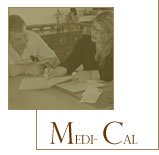Request a Consultation
Medi-Cal – basic rules of long term care

WHAT IS MEDI-CAL?
Medi-Cal is California’s Medicaid program, which is funded by both federal and state funds. It is overseen by the Department of Health Care Services. Medi-Cal has two divisions: one of them provides regular medical care for low-income individuals and the other provides assistance with paying for the high costs of nursing home care. This information is geared towards eligibility for the Medi-Cal Long Term Care program. To receive these Medi-Cal benefits, the applicant’s (and spouse’s, if married) assets must be within the Medi-Cal resource limits. If assets exceed the Medi-Cal resource limits, the excess must be “spent down” until the guidelines are met.
CHARACTERIZATION OF ASSETS.
The first and most important concept of understanding Medi-Cal Long Term Care eligibility is the way the state classifies assets into 2 categories: COUNTABLE ASSETS and EXEMPT ASSETS. (Exempt assets will not affect a person’s eligibility for Medi-Cal Long Term Care…in other words, these assets are not counted.)
- Countable Assets.
- Resource Limits: An applicant cannot have countable assets in excess of the applicable resource limits, which for the year 2016 are as follows:
- SINGLE APPLICANT: $2,000 IN APPLICANT’S NAME NO OTHER ASSETS
- MARRIED APPLICANT: $2,000 IN APPLICANT’ NAME
- APPLICANT’S SPOUSE: $123,600 IN SPOUSE’S NAME
- BOTH SPOUSES IN $2,000 IN EACH SPOUSE’S
- LONG TERM CARE: NAME; NO OTHER ASSETS
- Resource Limits: An applicant cannot have countable assets in excess of the applicable resource limits, which for the year 2016 are as follows:
- What Assets are Countable? These must be spent down and/or converted to Exemptor Unavailable assets prior to application:
- Bank Accounts (Checking/Savings)
- Money Market Accounts
- Certificates of Deposit (CDs)
- Mutual Funds
- Stocks & Bonds
- Real Estate (other than the home)
- Cash Value of Life Insurance greater than $1500
A. Exempt Assets.
- The home and home improvements
- Personal Service Contracts
- Household goods and debt payments
- Personal effects, family heirlooms, jewelry, etc.
- One car
- Term life insurance policies without cash value
- Prepaid burial plans (if irrevocable)
- IRA’s and work-related pensions if in distribution (periodic payments of principal and interest)
- IRA’s and work-related pensions in spouse’s name
- Immediate Annuities (if annuitized for the annuitant’s life expectancy or shorter period of time)
B. Unavailable Assets.
- Listed Real Estate
- Trust Deeds and Notes
CHARACTERIZATION OF INCOME vs. ASSETS.
Treatment of an individual’s income is different than that of their assets. Once an applicant meets the proper asset resource requirements, the state will then look at their income to determine their SHARE OF COST, or their contribution towards their monthly cost of care
- Income (monthly) – includes: social security, pension, interest, dividends, etc.
- Income is used to determine SHARE OF COST (all income is counted, less a $35 personal needs allowance)
- SPECIAL RULE FOR MARRIED APPLICANTS: The spouse remaining in the home must have a Minimum Monthly Maintenance Needs Allowance of $3,090 per month before the applicant spouse’s income will be counted towards his or her SHARE OF COST.
- If monthly income is GREATER than the applicant’s cost of care, the applicant does not need Medi-Cal Long Term Care benefits because the assets (principal) will not be exposed to spend-down.
The Look-Back Period is a period of time during which Medi-Cal is allowed to inquire about an applicant’s financial history and question them about transactions and transfers made within the 30 months prior to application. THIS IS NOT A 30-MONTH BAR TO TRANSFERRING PROPERTY. In other words, an applicant can make transfers of their property during this time, however certain transfers may give rise to a period of ineligibility. (See Gifts/Period of Ineligibility below.) Furthermore, for transfers made to or from an irrevocable trust, the Look-Back Period is 60 Months.
GIFTS/PERIOD OF INELIGIBILITY.
- An applicant is allowed to make gifts of their property during the 30 months prior to application; however such gifts may cause a period of ineligibility to apply. This is simply a period of time during which an applicant is not allowed to apply for Medi-Cal Long Term Care benefits. Once this period of ineligibility expires, the applicant can then apply.
- For every gift of $8,841, a one month period of ineligibility is created. However, gifting smaller amounts may not create any period of ineligibility.
- The Average Private Pay Rate (APPR) for skilled nursing care in California is $8,841 per month and is used as the basis for determining periods of ineligibility for gifts in excess of this amount.
